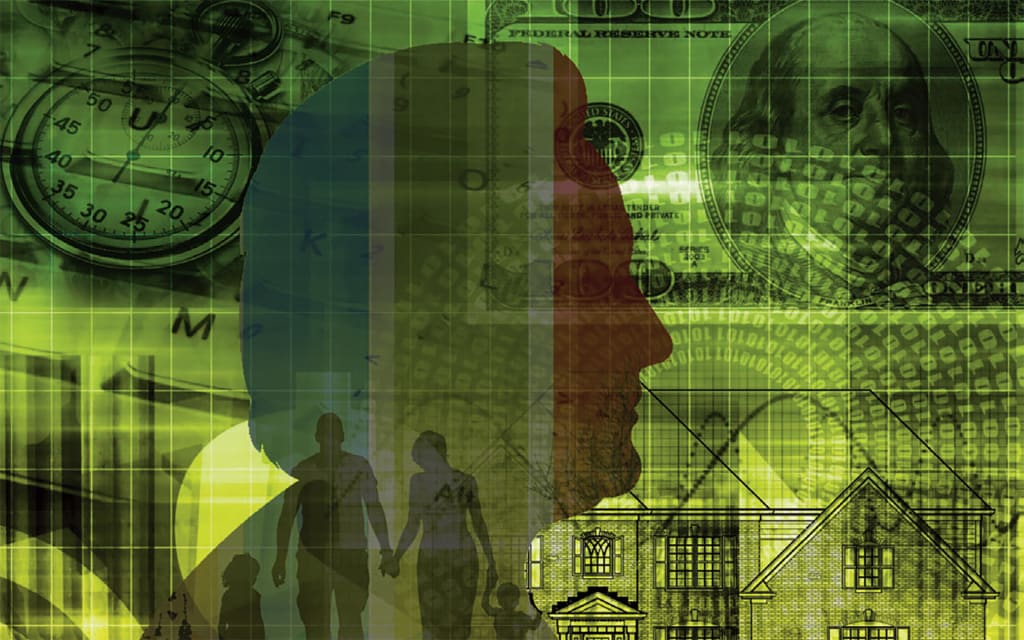The Future of Money & the Technology of Capitalism
What is value? How is value created? How will it be experienced? We take a science-fictional journey through the future of money.

The last receipt I received was a voucher for one month of unlimited classes, including Cross Training, Lean & Mean, Yoga, Pink Iron 101, and Team Training at Pink Iron, a women's gym in West Hollywood.
Jack Dorsey, the founder of Square—a mobile payment provider currently processing $11 million dollars a day—quaintly describes receipts as "a communication medium between the business and the consumer." He suggests that the value of a transaction is within the dialogue between merchant and customer. The transaction is the atomic unit of capitalism.
The first part of my transaction with Pink Iron was humanless and rather futuristic. I purchased this intangible on my iPhone using the GILT app. GILT is an e-commerce site that offers designer flash sales. I was sitting on my couch in my pajamas watching The Sopranos when I decided to make this purchase.
What is value? How is value created? What is the difference between value and capital? How is that value, or capital, embodied, objectified or institutionalized? I took an online course in economics, but I fell asleep during the part that explained this equation. I concern myself with abstractions dubbed "Invisible Capital."
These include not just economic capital but cultural, social, and human capital. Economic capital includes financial assets, including investments, real estate, equipment, and intellectual property. Cultural capital is the “embodied value” of what we have learned in school and in life, often represented as where we grew up, the degrees that we have, our fraternities or sororities, and so on. Social capital is who we know and who we have access to through our network. Human capital is what we know: our skills, knowledge and experience.
Visual Capital

As a “conceptual entrepreneur,” a term I’ve been using since 2008 to describe the practice of having ideas which become their own machines, I’m interested in visual capital. Visual capital is a form of cultural capital that considers how global media technologies have established hierarchies of knowledge and power based on peoples' relative access. Much as broadcast television reduced the family unit to discrete consumer segments, the commercial context surrounding networked screens and interfaces positions interactivity as a snack before consumption.
This is particularly true for e-commerce and financial services, like GILT, for example, or Kickstarter, which offer social "features" in order to increase visit duration. Rule of thumb dictates that the longer customers are on a site, the more they buy.
It's funny that “social” has become a new feature of the marketplace.
Today, interactivity can be roughly categorized as Human-Human, Human-Computer and Computer Mediated Communication. If I were to speculate, I’d imagine that future categories include Human-Cyborg, Cyborg-Cyborg and Cyborg-Mediated Computer Communication. But we’ll get to that in a moment.
The second part of my transaction with Pink Iron, the women’s gym, will be Human-Human redemption. I will have to put on "gym clothes," drive to West Hollywood (ugh) and find parking near Santa Monica and La Cienega (double ugh) and then, presumably, a buff blonde woman will accept my voucher and ask me why I decided to come in today and about my fitness goals, and THEN I'll work out. I'll do that for a month and at the end of it, I might become a member of Pink Iron.
That's one possible future.
Speculation and Innovation

The designer and researcher Mona Mahall writes that speculation "is [a] strategy that mediates between work and world, between intention and attention and that decides on success or failure of any effort." Mahall's book How Architecture Learned to Speculate describes speculation as "strategic acting" applied to economic, political and aesthetic values. "Values become mobile, valuations become a play with high and low, authors (architects) become winners or losers,” she writes, “and culture becomes fashion."
Hollywood makes its business transforming culture into fashion. In one future, in the real world, I might leverage my capital and start exercising regularly at Pink Iron. Here in Los Angeles, money will change hands in the traditional ways. Simultaneously, the speculative Los Angeles of film has already determined how I will spend my money in the future.
On October 26, 1985, Doctor Emmett Brown arrives from the future and tells Marty McFly and his girlfriend, Jennifer Parker, that he needs help to save their future children from getting into serious trouble. Minutes later they emerge from a time machine in the year 2015.
Two short years from now the world will be a much different place. Don't worry, all of our favorite brands will still be here. Pepsi bottles feature a new, more ergonomic shape. Pizza Hut pizza arrives freeze dried in aluminum packaging. It can be eaten after a few seconds in a counter-top Black and Decker Hydrator on "Hydrate Level 4." Texaco provides a substance called "havoline."
In late 2011 Nike jumped the gun, releasing 1,500 pairs of their 2015 (hypothetically) self-lacing sneaker in an eBay auction. From the press release, “The Nike Mag is no longer ‘the greatest shoe never made.’ The mythical shoe that captured the imagination of audiences is being released.” The highest winning bid was $9,959.00 for a size 10.
All of this happens in the suburbs. Just imagine the City of Angels.
By 2019 Los Angeles has fallen into irreversible decay. Genetically engineered robots, "Nexus 6 replicants," hide in the city's sprawl. (Side note: Google produces a tablet called the Nexus 7.) The replicants are manufactured by the Tyrell Corporation as off-world labor. They are banned on earth. If found they are "retired" by the police.
Humanity is conceived only as it supports the market. Human and non-human subjects are divided by labor.
Dr. Eldon Tyrell, the reclusive inventor of the replicant, states, "Commerce is our goal here at Tyrell. More human than human is our motto. Rachael is an experiment, nothing more. We began to recognize in them a strange obsession. After all they are emotionally inexperienced, with only a few years in which to store up the experiences which you and I take for granted. If we gave them a past, we'd create a cushion, a pillow for their emotions and consequently we can control them better.
But what does it mean to be human?
With his last breath, the android Roy, played by Rutger Hauer, recites a poem.
"I've seen things, you people wouldn't believe, hmmm....attack ships on fire off the shoulder of Orion. I've watched C Beams glitter in the dark near the Tannhauser Gate. All those moments, will be lost in time like tears in rain...time to die.”
Roy dies. We move now to a murder-free Washington, D.C. in 2054. Violence is controlled by the PreCrime police officers who rely on the talent of three "precogs" who witness murders before they occur.
The precogs developed their gift as a result of prenatal exposure to Clarity, the illegal psychoactive drug that our protagonist PreCrime Police Chief John Anderton is seen purchasing in this image.
Anderton uses cash for his illicit goods. Last year at the Future of Money and Technology Summit, an industry panelist noted that in the future "cash won’t be something that nice people do.” Cash is for drugs, sex and stolen goods.
Curiously, Anderton's black market eye transplant surgery is paid for using a credit card with Photo Security. Even more curiously, the card is swiped through a bulky reader that resembles the manual imprinters of yore.
Anderton's new eyes belonged to an Asian man. Upon entering The Gap, Anderton is greeted by a virtual employee: "Hello, Mr. Yakamoto! Welcome back to the Gap. How did those assorted tank tops work for you?" I assume that Yakamoto was killed when his eyes were harvested. How else do you go from buying an assortment of tanks to selling organs on the black market?
In the year 2169, genetic alteration has allowed humanity to stop aging physically at 25. Once one turns 25, the clock implanted in their forearms starts counting down from one year.
No longer a metaphor, "Time has become a currency," as Will Salas (acted, beautifully, I may add, by Justin Timberlake) explains in the opening monologue. Salas is a have-not living with his mother in Dayton, the poorest "Time Zone" in America.
Time is transferred from one person to another by touch, with or without consent. Dayton residents live in constant fear of having their "clocks cleaned" by The Minute Men, a band of thugs dressed in Diesel.
Each commodity is assigned a temporal value. This cafe menu allows for a quick measurement of the Purchasing Power Parity between US dollars and Time. A coffee in 2169 cost two minutes, compared to $2.90 at Starbucks in 2013. I'm not sure about the going rate for energy drinks, but they will cost five minutes and thirty seconds in the future.
The Matrix

Income inequality increases in the future. The distribution of wealth extends to life itself. The rich live forever and the poor die at twenty-five. "For a few to be immortal, many must die."
You believe it's the year 1999 when in fact it's closer to 2199. I can't tell you exactly what year it is because we honestly don't know. There's nothing I can say that will explain it for you. Right now we're inside a computer program.
This isn't real. What is real? How do you define real? If you're talking about what you can feel, what you can smell, what you can taste and see, then real is simply electrical signals interpreted by your brain. This is the world that you know. The world as it was at the end of the 20th century. It exists now only as part of a neural-interactive simulation that we call the Matrix. You've been living in a dream world. We have only bits and pieces of information but what we know for certain is that at some point in the early twenty-first century all of mankind was united in celebration. We marveled at our own magnificence as we gave birth to AI.
A singular consciousness that spawned an entire race of machines. We don't know who struck first, us or them. But we know that it was us that scorched the sky. Throughout human history, we have been dependent on machines to survive. Fate, it seems, is not without a sense of irony. The human body generates more bio-electricity than a 120-volt battery and over 25,000 BTUs of body heat. Combined with a form of fusion, the machines have found all the energy they would ever need. I came to realize the obviousness of the truth. What is the Matrix? Control. The Matrix is a computer generated dream world built to keep us under control in order to change a human being into this.
We live in the Matrix, so I need not describe it to you. Cash is still associated with criminal activity. Thomas Anderson (aka Neo) exchanged a disc (of pirated software perhaps) for $2,000, which he hides in a copy of Baudrillard's Simulacra and Simulations.
In 2199 people still work as computer programmers at companies with names like "Metacortex." They arrive late to work and are summarily reprimanded by their supervisors. They sit at a desk and stare into a void.
Neo escapes this monotony—and death—by becoming a cyborg.
When entertainment frames the future, it becomes a self-fulfilling prophecy. We create the world that we watched on screen as children. Everyday technology thrusts us into science fiction, because the aspirational promise of capitalism asserts that someday is always better than today.
About the Creator
Martine Syms
Conceptual entrepreneur based in Los Angeles. Works in publishing, video, and performance. Coined "conceptual entrepreneur" as her area of practice.






Comments
There are no comments for this story
Be the first to respond and start the conversation.